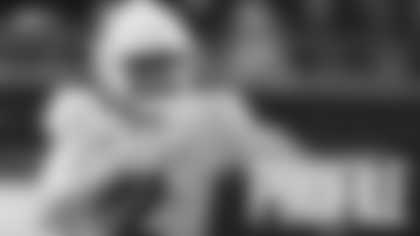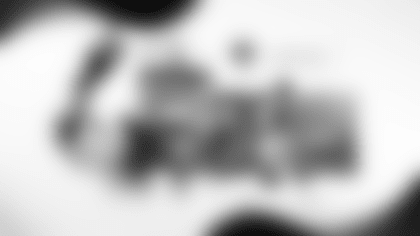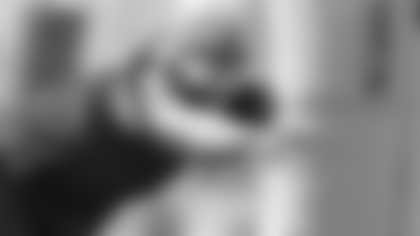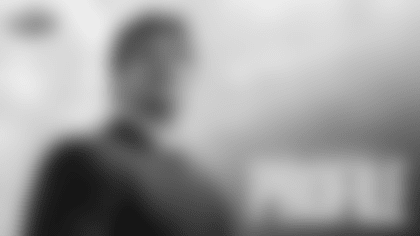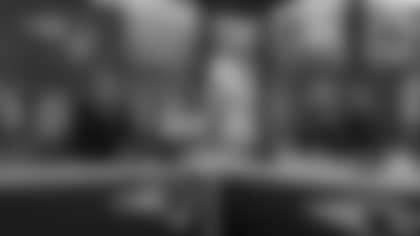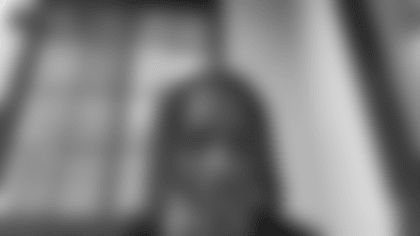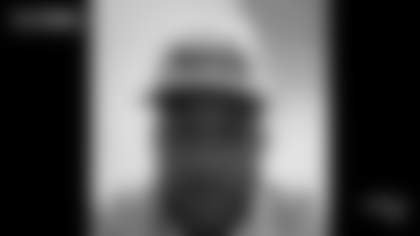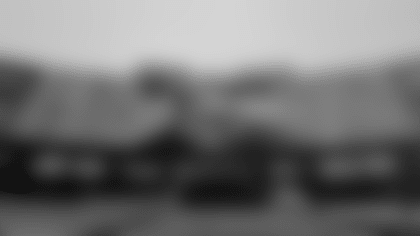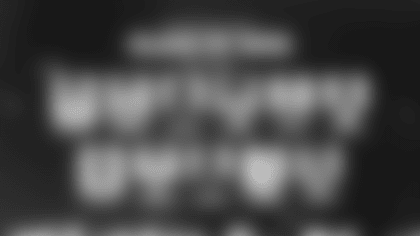BB: Alright, kind of moving through the week here. We're going to do some team situation work today and try to put a lot of the segmented portions of practice together, so down-and-distance, moving the field, kicking situations, communication, play calling and so forth, clock. As many things as we can kind of work into this practice and create similar to a game situation, that's what we're going to do today. We'll see how it goes, but hopefully it will give us a little bit of a day of experience as a team of doing it and make the overall operation go a little bit smoother when we actually have to do it next week. So that's our deal today.
Q: Do practice preparations differ at all when you bring in another team for joint practices?
BB: Not too much. I'd say the biggest difference would be if we were not practicing against another team, we would continue to install things next week, so we'd continue to add things to our daily routine. When you practice against another team, I think you're better off just going out there and running what you know. So, there won't be a lot of new installation next week for Jacksonville. We'll run what we've practiced through tomorrow and try to do it that way. I'd say that'd be the biggest change. If we weren't practicing against them, then we would continue to add things next week. But, we also would have to commit time to getting ready for the game next week, so running scout teams and running Jacksonville's plays against us, whereas when you practice against the team, that is the preparation. It kind of kills two birds with one stone there.
Q: What made you decide that Jacksonville would be a good team to practice with and what do you expect out of next week?
BB: I expect our team to improve and I think that Coach [Doug] Marrone and the program that they have down there, it will be good for us to work against. A lot of respect for what he did at Buffalo. He had a very, very tough team to compete against when he coached in our division. He did a great job throughout his career - Syracuse, when he was an assistant in this league - so, a lot of respect for Doug and the program he runs.
Q: The Pro Football Hall of Fame induction is this weekend. Does anyone stand out from this year's class to you?
BB: Yeah, I mean they're all great players and Jerry [Jones] and all the rest of them. Really, just trying to focus on what we're doing, trying to coach our team, trying to do a good job. That's my job.
Q: Are there certain positions you can evaluate better in a scrimmage setting than in a traditional practice setting?
BB: Well, again, this is putting it all together. So, instead of doing one thing for a sustained period of time, which isn't really the way football is played, this gives us a chance to simulate the moving game - first down, second down, third down, ball moves, field position moves, the kicking unit comes on the field, other offensive or defensive unit comes out on the exchange - and that's how you play. You don't run 10 first-down plays in a row. You don't run eight third-down plays in a row or eight sub-blitzes in a row or 10 punts in a row. That's just not football, but those are good teaching methods and it's a more efficient way to do it, so there's a place for that. But, at some point, there's a place for trying to simulate a game, so that's what we're going to do.
Q: Are there players that look better in a scrimmage or game simulation type of practice than a traditional practice?
BB: Could be. We'll see. I don't know.
Q: You mentioned the exchanges between units on the field. Is that any more challenging now because you have so many bodies with 90 guys on the roster?
BB: Yeah, of course. Yeah, we have 90 guys and we have basically three groups on each side of the ball, whereas in the regular season, however many players are doing most of the playing on offense and defense - I don't know, 15, 16, 17, however many guys it is - there's a lot fewer substitutions. It's a lot cleaner. Of course, if something happens during the game to somebody, then that affects a lot more, so you don't have a backup for every spot in the game in the regular season like we kind of do here. But, yeah, it's challenging.
Q: How have you felt about the cleanliness of those exchanges thus far in camp?
BB: I'd say it's probably much like everything else in training camp. I think we're improving at everything that we're working on. You always want to go at a little bit of a faster pace, but we're a lot better than where we were. But, we still have a long way to go. We've got a lot of work to do. It's really hard to measure those things until you actually compete against another team and see where you are relative to them. Where we are is we always are looking to get better. We're always trying to improve. We always want to be as efficient as we can. How does that compare to everybody else? Who knows. We won't find that out until we start competing against them.
Q: How beneficial do you think it is going against a big receiver like Allen Robinson in joint practices, a type of receiver you can't simulate in a traditional practice?
BB: I mean, when Rob [Gronkowski] flexes out, he's about as big as anybody we're going to play against. But, look, it's always good to go against different players. Every player has their own unique skill set and all the players in this league are good. So, it's always good to see different types of matchups so that each of us, our guys can work against the variety of players that we have, the variety that our opponent has - and not only players but scheme - and see a different scheme, see a different player, a different type of player and different skill set. Those are all valuable experiences, sure.
Q: When it comes to planning joint practices, do you submit a plan of what you want to work on and then amend it based on what the opposing team wants to work on?
BB: Well, since this is the first time we've worked with Jacksonville - I'd say, for example, New Orleans is a team we've worked together. So, in that example, last year, we could go back to things we'd done previously and [say], 'This is the way we'd laid it out. Do we want to do it this way?' But in this case, Coach Marrone and I have talked about it. What are the things that we want to try to accomplish? How many days? What do we generally want to do each day? What are the points of emphasis? And then we put together something and kind of red penciled it. How about if we do it this way or adjust it this way? And so that is, I would say, relatively easy. There are some things that a team - you know, we have a certain practice structure, a certain way of doing certain things. It's not right or wrong, it's just the way we do them. You have another team that they're playing the same game, but maybe they do things just a little bit differently. I'd say, when those don't coincide, then as coaches, we try to find what the common ground is. Either we're going to do it your way or you're going to do it our way or we're going to maybe split the difference depending on what the issue is. And so that's, I wouldn't say challenging, but I think that's one of the things that needs to be ironed out. And I think it's usually better if everybody can do it the same way, so there are certain periods of practice at the beginning of practice where both teams do their own thing separately, and then when we come together, then there's a certain standard or conformity that we want there to be so that everybody's on the same page. It's not one way for our defense and another way for their defense or vice versa, that kind of thing. But Jacksonville's been great to work with. Their support staff, the people that are part of the operational side of it, that's been great. Our people on our side have done a great job, as they always do, in working with the team that's coming in. We've had great cooperation when it's gone the other way. We're expecting three days of very productive work against Jacksonville. That's just, I'd say, in general how it goes. Once you have the conversation with the coach and we kind of agree to, 'Well, this is conceptually the way we want to do it,' then it's kind of dotting the i's and crossing some t's and just working it out so that we can actually get to the point that we agree on.
Q: Do you feel like Malcolm Butler's competitiveness rubs off on other players and helps raise the level of competition in practice?
BB: Yeah, sure. Malcolm is a very competitive player, but I think we have a lot of other players on our team that are very competitive, as well, both on the field and off the field. We create other competitive situations, not just practice, but we do other things and you can really see that come out with the guys. It's a quality that is a strong trait with the vast majority, if not the entire team. It's a very competitive team. As a team, once we go up against a team, team against team is competitive. But, individually, if we set up an individual type of competition, then that's pretty competitive, too, in a good way - in a good, healthy way.
Q: When Julian Edelman and Malcolm Butler are matched up against each other, do you like seeing their competitiveness?
BB: Yeah, I mean, again, I think there's a lot of good, competitive situations out there. I wouldn't want to single one out over another, but through the years and this year, we see a lot of those. A lot of times, when you see the one-on-ones, guys will kind of matchup up a little bit so that they can have that competition, whether it's pass rush-pass protection drill or a tackling drill or a one-on-one route coverage drill or whatever it is. Again, not that they don't work against other guys, but sometimes you just want to go out there and compete on that particular play. But, no, I think it's healthy, it's good and I think that's really one of the things that we'll hopefully be able to do that this year, but in the past has been good for our team is the level of competitiveness.










